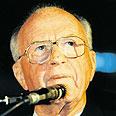
Rabin was a rightist
Op-ed: Rabin abandoned leftist socioeconomic vision, left mostly negative legacy
Yitzhak Rabin was a crappy prime minister. This is apparently what Labor Knesset Member Einat Wilf thinks – this week she proposed that his photograph displayed in the room used by Labor’s Knesset faction be replaced by a photo of Ben-Gurion and moved to a less prominent spot.
Her faction members automatically resisted. In their view, depreciating Rabin’s status is something done by the Right. Yet the impassioned zeal displayed by Labor activists won’t change the fact that Rabin does not have a legacy – and if he does, it’s mostly negative.
With the exception of maybe one issue, Rabin is not worthy of taking his place in our national memory more than a prime minister like Moshe Sharett, for example. Rabin’s only positive move was the National Health Insurance law. This law made Israel’s healthcare system one of the best in the world. Had it not been for Ehud Barak and Benjamin Netanyahu, who tinkered and are still tinkering with it, Israel would have won a medal.
On all other fronts, Rabin made matters worse. A few months before he was murdered, Rabin admitted that he made a grave mistake with the Oslo Accord. He did not do so by “giving up too much,” as his rightist rivals claimed. Rather, he erred with the concept of signing interim deals without knowing where they are leading to.
Rabin, on Shimon Peres’ recommendation, was scared to finalize all the loose ends of the conflict. He exploited the PLO’s weakness and created a deal where the Palestinians gave in to Israel’s inability to agree on its eastern border, to economic inequality, and to Israel’s good will (which never existed) to secure a final-status agreement.
The Washington lesson
However, Rabin’s gravest damage was done on the socioeconomic front. Rabin arrived in politics from the army. His socioeconomic education came from Washington, where he served as ambassador. There, he got excited by the American socioeconomic model, where mutual responsibility is despicable and where everyone cares for himself. In the US it is the capitalist, the “entrepreneur,” who rules the economic creation, while labor unions are a nuisance that should be done away with.
The most prominent expression of this was the stock exchange tax. Under pressure by his finance minister, and this wasn’t simple, Rabin agreed to go for it. Up until then, stock profits were tax-free. The move was drafted vis-à-vis harsh objection by the economic elite which Rabin so much enjoyed to spending time with, celebrating with, drinking with, and rubbing elbows with. When one day he flew to China, he took elite representatives with him – today we call them tycoons – and allowed them to kill the proposal.
Rabin was the first Labor party prime minister who abandoned the leftist rhetoric. Today, Ehud Barak may create a semi-scandal over the loyalty oath to a “Jewish state,” yet he (or Welfare Minister Isaac Herzog) says nothing as to the growing income inequality in Israel.
We remember Rabin not because of his actions, but rather, because of Yigal Amir’s act. If Rabin has a legacy, it is the Labor party’s sharp turn to the Right, which prompted it to become wholly similar to the Likud and Kadima (which is no more than Likud in a custom.) Yet Rabin did not invent anything new. He was a Likudnik at heart even before. He managed to win the 1992 elections only because his voters identified him as a rightist, who knows how to break Arab bones.
There is something symbolic about insisting on displaying Rabin’s photo at Labor’s Knesset room. The fans of the “Rabin legacy” are fans of the Right. Yet it’s unpleasant for them to admit it when MK Wilf implicitly throws this in their face. So they feed us nonsense, as if Rabin was different than the Likud fan club, which is today the essence of the Labor party.
- Follow Ynetnews on Facebook










